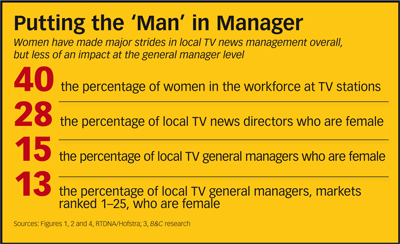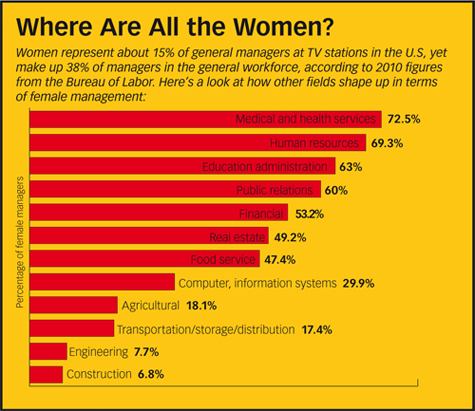Closing the General ManagerGender Gap

The smarter way to stay on top of broadcasting and cable industry. Sign up below
You are now subscribed
Your newsletter sign-up was successful
When Marla Drutz arrived in Detroit as an ambitious young research analyst in 1989, the market featured a robust tradition of females running TV stations. Drutz was mentored by a pair of respected general managers at WXYZ, Jeanne Findlater and Grace Gilchrist, while Amy McCombs was another role model as the WDIV boss. If those women could attain the highest level at a TV station in a “lunch pail town” like Detroit, recalls Drutz, she knew it was possible for her as well. “There was the perception that it could be done,” Drutz says. “My experience was that women could have any job at the station. People in the business told me that, and showed me that.”
Drutz did eventually reach that level, as WDIV appointed her general manager in 2008. Yet while she came of age amidst a rich heritage of female general managers, Drutz currently represents the only female GM in DMA No. 11. It may not be a particularly strong showing for Detroit, but at least that’s one more female station chief than the Big Four stations have in New York, Los Angeles, Boston, Atlanta, Denver, Cleveland, Indianapolis and Baltimore.
No one disputes that women have made giant strides in local television, as evidenced by Emily Barr’s promotion this month from WLS Chicago general manager to Post-Newsweek president (Barr is Drutz’s new boss). Yet female leadership at TV stations is still woefully lacking.
B&C tabulated general manager gender at Big Four stations in the top 100 markets and found that approximately 59 out of 388 station general managers, or 15.2%, are female. (B&C included a handful of large-market stations outside the traditional Big Four, such as WGN Chicago, KTVK Phoenix and KMEX Los Angeles.)
An August 2011 survey by Radio Television Digital News Association (RTDNA)/Hofstra University revealed that just 15.8% of the general managers at all news-producing stations were female, which was “virtually unchanged” from the previous year, says study author Bob Papper.
While most station group chiefs will readily offer that their target viewer is female, women don’t seem to always get the same degree of attention when it comes to hiring general managers. “A number of companies do a good job of hiring women in these positions, and others have stepped in more recently,” says Deb McDermott, president of Young Broadcasting. “But we all need to do a better job.”
'Spousal Veto' Looms Large
Local TV veterans offer a wide array of educated guesses as to why male general managers outnumber females almost 7 to 1. Their responses suggest the issue is less about the hiring practices of broadcast companies than with the female candidates themselves. While gender roles have undoubtedly shifted over the decades, with more women chasing challenging careers and more men sharing the parenting workload, it’s evident that the bulk of domestic responsibilities still remain with women.
Faced with the herculean task of programming a 24/7 multiplatform media outlet, managing several large departments and performing the considerable civic roles required of a station general manager, not to mention periodically hopscotching from state to state to manage larger stations, many women appear content to remain in a less demanding role. “Some people just don’t have the support system,” says Rebecca Campbell, president of the ABC Owned Television Stations group. “That holds them back—they don’t feel they can do both [family and career].”
Marci Burdick, senior VP at Schurz Communications, has seen women in broadcasting draw what she calls “tight circles” around their career aims. They are very specific about the position, station and market they want to work in, and will turn down promotions that don’t fit inside their circle. “It often has to do with family issues—raising children, providing care for aging family members,” Burdick says. “That in" uences career decisions, and I hear that more from female candidates than male candidates.”
And in an economy that continues to sputter, some broadcast vets say the “spousal veto” is increasingly a factor in preventing women from taking a general manager position, particularly one that involves relocation. “In this economy, anybody who has a job wants to keep their job,” says one veteran female general manager. “If the spouse can’t get a comparable job, he won’t go.”
Other industry watchers cite a lack of con! dence or assertiveness among female broadcasters, or a paucity of female role models in management ranks. DJ Wilson, president and general manager at KGW Portland, mentions a number of women lining up to thank her after she introduced a mayoral debate recently, for simply being a community leader who is female. “Maybe women haven’t had mentors to show them they can play at this level,” Wilson says.
Men Control Sales, Sales Controls Pipeline
Amidst a local media environment that is increasingly about roundthe- clock content, general managers come from a broader array of station departments, including news, finance and creative services. The RTDNA/Hofstra study showed that 28% of news directors are female, and the number is climbing. Yet sales, still one of the more maledominated departments, continues to be the primary pipeline for general managers. “More and more general managers come out of news, but that’s not where most come out of,” says Papper. “I’d bet you there are more women in sales than there used to be, but it’s still dominated by men.” (Neither RTDNA nor the TVB trade association have statistics on gender breakdown in station sales departments.)
To be sure, the 15% female general managers figure represents, by all accounts, an improvement over previous eras in local TV. “Fifteen years ago, it wasn’t 2%,” says one veteran female station leader. “I’m sure of it.”
Moreover, that figure is consistent with other industries—meaning broadcasting isn’t much better or worse at producing female leaders than, say, banking or telecommunications. A recent Wall Street Journal/McKinsey study on gender in management showed that 53% of entry level jobs went to women, falling to 35% at the director level, 24% among senior VPs and only 19% in the so-called C-suite.
Research firm Catalyst reported that Fortune 500 companies’ director/executive officer ranks are 14.1% female, while the Bureau of Labor says 38% of general, and 51.5% of professional, workplace managers are women.
“[Broadcasting’s 15%] is not too out of line with other industries,” says Anne York, a pay equity specialist and associate professor of economics at Meredith College in Raleigh, N.C.
Yet the low representation among female general managers is more striking in local TV, considering that female viewers typically outnumber male ones by several percentage points and are sought after by marketers for their outsize clout in daily purchasing decisions. ABC’s Campbell mentions being up for a program director job at WPVI Philadelphia years ago, and falling right into the station’s key women 25-54 demo. “I thought, ‘Why wouldn’t you hire me—I was right there!” she says. “I had the same life experience [as the target audience], and I think that connection is really good—not just for a television station, but for any organization.”
And as stations’ viewership bases become more diverse, particularly with the sustained influx of Hispanic viewers, several industry insiders say greater diversity in a station’s management ranks can be a strategic advantage. “The communities we serve are increasingly diverse, with more multicultural backgrounds,” says Barr of Post-Newsweek. “I think we’re all paying attention to that as much as we can.”
While the increase in female news directors is heartening, York says more females in the GM ranks will make for a broader range of perspective when it comes to content. “Given the role of media in society to inform the public and in some way to shape public debate by the types of stories that are told and how they are told,” she says, “I would argue that much more needs to be done for women to have leadership roles at TV stations."

Best and Brightest Broadcasters
While the RTDNA’s figure on female general managers was flat from 2010 to 2011, other indicators suggest that things are poised to get more balanced. With Barr’s promotion this month, a number of major station groups, including Post-Newsweek, ABC, NBC, Schurz and Young, feature female chiefs, while women also hold CEO titles at Gannett, Belo and Fisher.
Campbell cites a get-together for ABC Owned Television Stations, when she, senior VP of digital media Carla Carpenter, Emily Barr, and senior VP of sales Debra O’Connell, along with VP of engineering Dave Converse, presented to Anne Sweeney, president of Disney/ABC Television Group.
Colleen Brown, Fisher president/CEO, mentions a corporate leadership summit in Seattle last summer, which featured 10 men and 10 women. “When I got into the business 32 years ago, there were [just a few] female general managers,” Brown says. “We seem to have made huge progress. In the not-too-distant future, I don’t think we’ll look at it in terms of women or men.”
After all, every woman in a TV station leadership role -- from Colleen Brown to Raycom VP of news Susana Schuler to Belo senior VP Kathy Clements -- is a reminder to thousands of aspiring young women that those positions are open to anyone with the right smarts, drive and ambition.
For Marla Drutz, seeing her boss, the retiring broadcast legend Alan Frank, succeeded by Emily Barr was another indicator that—despite statistics that suggest otherwise -- any and every post in local TV is attainable. “You absolutely can have this job and a family and have a wonderful life,” Drutz says. “Men have proven that to us for decades.”
E-mail comments to mmalone@nbmedia.com and follow him on Twitter: @BCMikeMalone
The smarter way to stay on top of broadcasting and cable industry. Sign up below
Michael Malone is content director at B+C and Multichannel News. He joined B+C in 2005 and has covered network programming, including entertainment, news and sports on broadcast, cable and streaming; and local broadcast television, including writing the "Local News Close-Up" market profiles. He also hosted the podcasts "Busted Pilot" and "Series Business." His journalism has also appeared in The New York Times, The L.A. Times, The Boston Globe and New York magazine.

